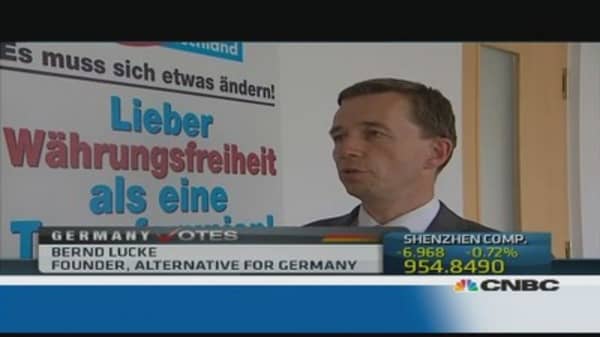The leader of Germany's new euro-sceptic party, Alternative for Germany (AfD), says the southern countries of Europe should be forced out of the single currency and that it should be possible for every European citizen to sue its government if it pays the debts of neighboring countries.
Bernd Lucke, who founded the AfD in early 2013, told CNBC that Germany was on completely the wrong track when it came to the handling of the euro zone crisis and that his party offered a clear alternative to dealing with the problem.
"First things first, the southern European countries should leave the euro because they have proven not to be competitive," he said, "and the alternative for them would be a decrease in wages by about 30 percentage points which is unacceptable for working class people."
For the nations left inside the euro zone, Lucke advocates a reform that would ensure a "sharpening" of the bailout clause so that it would not be possible for any one country to pay for the debts of other countries, adding, "and that any kind of citizen has the possibility to sue the government if it ignores this clause."
In Germany's federal elections in September, the AfD will need to achieve at least 5 percent of the vote to ensure representation, something which the small and similarly alternative Pirate Party of Germany managed to do in the 2011 Berlin state elections, securing 8.9 percent of the vote.
While Lucke is confident of success, Peter Matuschek, head of policy research at Forsa, a German polling company, says that AfD has a mountain to climb to reach the necessary threshold in September.
"First of all, it is a one-issue party with the euro as the overwhelming issue," he said, explaining AfD's flaws. "We saw in the 1998 election that the pro-Deutschmark party won 0.9 percent of the vote when the Germans' attitude to the euro was much more negative than it is today.
"Today, we have 27 percent who would like to have the Deutschmark back against more than 69 percent who would like to keep the euro."
Matuschek says that Germans have "made their peace" with the euro and that Merkel is popular because of the way she has represented German interests.
"I think that Merkel's popularity is not so much due to how the economy is developing but her way of dealing with the euro crisis," he said. "She is transmitting an image of good leader, a person who defends German interests well abroad, so she has a lot of trust among German voters so this helps her in these elections."
Still, in the face of Merkel, who is seeking a third successive term as chancellor, Lucke is confident.
He told CNBC: "We are very confident because we have lots of support on the streets, we have lots of support on the Internet. We think that polls which seem to indicate that we may not be successful seem to underestimate our success."



